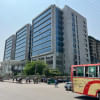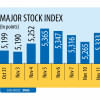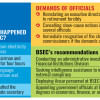Widen corporate tax gap between listed, non-listed firms

Stock market intermediaries yesterday urged the government to widen the corporate tax rate gap between listed and non-listed companies to encourage more companies to go public.
They also called for reducing the tax imposed on brokers considering the bearish trend of the market.
The demands came during a discussion on "Budget 2023-24: Capital Market Perspectives" jointly organised by the Capital Market Journalists' Forum (CMJF) and the Bangladesh Merchant Bankers Association (BMBA) at the former's office in the capital.
Planning Minister MA Mannan said he would convey the demands to the high-ups of the government.
"As the economy is growing, a strong capital market is needed, but in Bangladesh, it is still not in a position to drive the economy forward," he said.
He said discussion had been going on for years on bringing in more multinational companies to the capital market.
Currently, the corporate tax rate for listed companies is 20 per cent while it is 27.5 per cent for non-listed companies.
"But the discussion has not seen much success. Stakeholders should continue to focus on it."
Md Sayadur Rahman, president of the BMBA, said the positive side of the budget was that no new tax was imposed.
"But the disappointing side is that no policy support was proposed either. In fact, the budget did not discuss any issue related to the stock market."
He urged the government to widen the corporate tax rate gap between listed and non-listed companies to attract non-listed companies to the market.
Currently, the corporate tax rate for listed companies is 20 per cent while it is 27.5 per cent for non-listed companies. These rates are not applicable for banks, insurance companies, non-bank financial institutions and telecommunication and tobacco companies.
The tax rate for listed banks, insurance companies and NBFIs is 37.5 per cent. It is 40 per cent for the non-listed firms in the same categories. The rate is 45 per cent for telecommunication companies and tobacco companies.
The BMBA chief also called for canceling the double taxation on dividends and the advanced income tax on bonds.
He explained listed companies declare profits after deducting the corporate tax. And when they distribute profit among the shareholders in the form of dividends, the companies also deduct the tax on the income.
"Market intermediaries see this as a double taxation."
Richard D'Rozario, president of the DSE Brokers Association of Bangladesh, said many top government officials have assured that the double taxation issue would be addressed but no step has been taken so far.
"We are disappointed."
He said the government should give some incentives to encourage companies to go public.
"Though it seems costly initially, it will pay huge dividend in the end."
For example, he said, when a company gets listed, it can't evade tax since it has to come under many regulatory agencies.
In the international stock market, when a company get listed, it expects a proper valuation of it. But the companies in Bangladesh do not prefer to get listed for a number of factors, said D'Rozario.
"In order to change the tendency, the government will have to give some incentives."
Prof Hafiz Md Hasan Babu, chairman of the DSE, said the capital market plays a vital role in driving economic growth in many countries. In Bangladesh, the stock market seems to have been stuck at a stage.
"If it receives some policy support from the government, it also can play a significant role in accelerating economic development," he added.
Asif Ibrahim, chairman of the Chittagong Stock Exchange, said many stock brokers are passing tough period, so the tax on turnover should return to the previous rate of 0.015 per cent from the present 0.05 per cent.
"The government should work to bring more multinational companies to the market in order to make it vibrant."
According to Ibrahim, the stock market should reach such a strong position so as to provide long-term financing.
Ibrahim said most large businesses in Bangladesh take loans from the banking sector to run their day-to-day operations and expand. "But they should go to the capital market to raise funds at a far lower cost."
If companies do not turn to the capital market for funds, the pressure on the banking sector will not lessen, he said, adding that banks are currently working as a long-term fund provider.
"For long-term financing, the bond market also can play a significant role. The government can emphasise on it."
Ziaur Rahman, president of the CMJF, and Abu Ali, general secretary, also spoke.

 For all latest news, follow The Daily Star's Google News channel.
For all latest news, follow The Daily Star's Google News channel. 








Comments